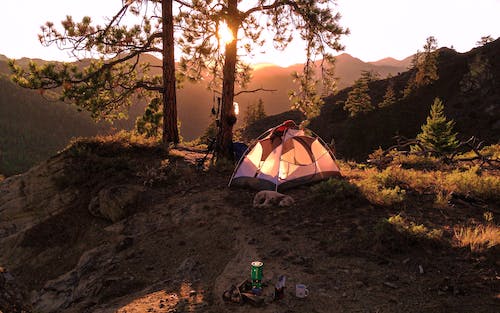|
|
Are you embarking on a camping adventure? Get ready to make a difference while you explore the great outdoors! Eco-camping isn’t just a trend – it’s a conscious choice that lets you immerse yourself in nature while leaving a minimal ecological footprint.
Whether you’re a seasoned camper or new to the experience, embracing sustainable practices can turn your outdoor escapade into an eco-friendly journey that benefits you and the environment.
From choosing the right gear to practicing Leave No Trace principles, this guide will walk you through essential eco-camping tips for a truly green and unforgettable outdoor experience. Let’s dive in and discover how you can enjoy the beauty of nature while preserving it for generations to come.
Key Takeaways
- Eco-Camping Essence: Eco-camping blends nature and adventure through responsible choices that minimize environmental impact.
- Nature Preservation: Eco-camping values preserving the beauty of wild spaces by practicing Leave No Trace principles.
- Eco-Camping Benefits: It safeguards resources, reduces waste, and supports delicate ecosystems, making you a planet-friendly camper.
- Conscious Choices: Choose an eco-friendly campsite with sustainable practices, such as recycling facilities and solar-powered amenities.
- Eco-Friendly Gear: Opt for gear like biodegradable soaps and reusable water bottles to minimize waste and promote sustainability.
- Leave No Trace: Adhere to the 7 principles to minimize ecological footprint, ensuring minimal impact and respectful camping.
- Camper Selection: Choose energy-efficient campers with features like solar power or lightweight construction.
- Preparation Checklist: Compile essentials like clothing, bedding, and cooking gear to minimize waste and last-minute purchases.
- Safety and Mindfulness: Prioritize safety, follow guidelines, and respect fellow campers and nature.
Why Is Eco-Camping Important?
The World Wildlife Fund highlights that sustainable camping can help safeguard natural resources, reduce waste, and preserve delicate ecosystems. When you opt for eco-friendly practices, you become a wildlife guardian and champion of a healthier planet. So, before setting off on your next camping adventure, consider Leave No Trace principles and ensure your journey leaves only footprints and memories.
How Can I Make My Camping Trip More Eco-Friendly?

Making your camping trip more eco-friendly involves conscious choices and actions that positively impact the environment.
- Select an eco-friendly campsite. When selecting an eco-friendly campsite, look for those with integrated sustainable practices to minimize their environmental impact. Consider camps that offer recycling facilities and utilize solar-powered amenities as a testament to their commitment to sustainability.
Example 1: Recycling Facilities
Some campgrounds promote recycling by providing designated recycling bins and waste separation stations. For instance, California’s Crystal Cove State Park offers well-marked recycling bins throughout their campgrounds, encouraging visitors to sort their waste and contribute to recycling efforts properly.
Example 2: Solar-Powered Amenities
Many eco-conscious campsites integrate solar power to reduce reliance on traditional energy sources. For example, Camp Glenorchy in New Zealand is known for its eco-friendly accommodations, featuring solar panels that generate significant energy needs.
By researching and choosing campsites incorporating such sustainable practices, you enjoy a responsible and eco-friendly camping experience and support establishments actively contributing to environmental conservation.
- Equally important is the selection of your camping gear. Opt for environmentally conscious equipment, such as biodegradable soaps and reusable water bottles, to minimize waste and support sustainability efforts.
These choices resonate with the core tenets of responsible camping endorsed by reputable sources, such as the National Park Service.
Examples of Eco-Friendly Campsites:
The “Leave No Trace” principles many National Parks adopt powerfully illustrate campsites embracing eco-friendly practices.
For instance, Yosemite National Park in California adheres to these principles by encouraging visitors to minimize their environmental impact. The park provides recycling facilities, emphasizes reusable containers, and advocates for sustainable camping practices.
By choosing campsites that incorporate such sustainable practices, you actively participate in reducing your ecological footprint and preserving the natural beauty of these areas for generations to come.
- Minimizing your ecological footprint while camping requires adhering to the “Leave No Trace” 7 principles such as:
- Plan Ahead and Prepare: Research and plan your trip to minimize impact and ensure safety.
- Travel and Camp on Durable Surfaces: Stick to established trails and campsites to avoid damaging sensitive areas.
- Dispose of Waste Properly: Pack out all trash and dispose of human waste properly to maintain the cleanliness of the environment.
- Leave What You Find: Preserve natural and cultural features without disturbing them or taking anything with you.
- Minimize Campfire Impact: Use established fire rings and keep fires small to prevent damage to the surroundings.
- Respect Wildlife: Observe animals from a distance and avoid feeding them to prevent disrupting their natural behaviors.
- Be Considerate of Other Visitors: Keep noise levels down and yield the trail to others to ensure a positive and respectful outdoor experience.
Camping Gears to Bring

When preparing for your camping adventure, ensuring comfort and safety is crucial. Here are the essential camping gears to bring:
- Tent
- Sleeping bag
- Camping stove
- Appropriate clothing for the weather
- Solar-powered charger for electronics
- Portable water filter
- Eco-friendly camping gear options
- Recycled or sustainable materials
Essential items like tents, sleeping bags, and camping stoves are must-haves. To enhance sustainability, opt for solar-powered chargers and portable water filters. Choose gear from recycled or eco-friendly camping materials, like tents from recycled fabrics and sleeping bags with eco-friendly insulation.
Efficient packing, rolling clothes, and using organizers or compression sacks help maximize your backpack or storage space. With these considerations, you’ll be well-equipped for a memorable and eco-conscious camping experience.
How Can I Have a Sustainable Camping Experience?

To have a sustainable camping experience, it’s essential to consider various aspects of your trip, from cooking to waste disposal.
- Cooking: Using a camping stove prevents environmental damage and air pollution. Choose sustainable fuels like biofuel or natural gas to lower carbon emissions.
- Waste Disposal: Pack out all trash, and use designated bins and recycling facilities. Follow proper waste disposal guidelines to minimize environmental impact.
- Toilet Practices: Dig a hole for nature’s call, and use responsible toilet paper. This reduces the impact on the environment.
- Wildlife Respect: Maintain distance and avoid feeding or disturbing wildlife. Observe from afar, respecting their natural habitat.
A sustainable camping experience involves conscious choices from cooking methods to waste disposal, ensuring minimal environmental and wildlife impact.
What Are Some Eco Camping Tips for Beginners?
- Camper Selection: Opt for energy-efficient campers with features like solar power or lightweight construction. For example, Airstream offers campers solar panels for eco-friendly energy.
- Preparation Checklist: Compile a checklist including clothing, bedding, cooking gear, and personal hygiene items. This minimizes last-minute purchases and waste. National Park Service offers a packing guide for efficient preparation.
- Safety and Mindfulness: Prioritize safety by understanding weather and potential hazards. Follow safety guidelines and respect fellow campers and nature. REI’s camping tips provide insights into responsible camping.
For novice eco campers, informed decisions while selecting campers, thorough preparation, and mindfulness contribute to an enjoyable and eco-conscious camping experience.
Frequently Asked Questions
Eco camping, also known as eco-friendly camping or sustainable camping, refers to camping practices that are mindful of the environment and aim to minimize the negative impact on natural resources and ecosystems.
There are several ways to make your camping trip more eco-friendly. Some tips include using sustainable camping gear, following the “leave no trace” principle, using biodegradable soap, camping at designated campgrounds, and disposing of waste properly.
Eco camping is important because it helps to protect the natural environment and conserve resources. By minimizing our impact on ecosystems, we can preserve the beauty of wild spaces and reduce our carbon footprint.
To minimize campfire impact, building fires in designated areas and following campground rules are important. Use existing fire rings whenever possible and avoid collecting firewood from the natural environment. Always fully extinguish the fire before leaving.
Tent camping generally has a smaller environmental footprint compared to RV camping. Tents have a lower impact on the natural environment and use fewer resources. However, both types of camping can be made more eco-friendly by practicing sustainable choices.
When camping, it is best to set up your campsite at least 200 feet away from any water sources such as rivers, lakes, or streams. This helps to protect the water quality and minimize the disturbance to aquatic ecosystems.
When eco-camping, it is important to follow the principles of “leave no trace.” Use designated campground facilities if available; otherwise, bury human waste 6-8 inches deep in a hole at least 200 feet away from water sources and camp areas.
Yes, you can rent eco-friendly camping gear from outdoor gear rental companies. Renting gear is a sustainable option as it reduces the demand for new products and allows you to try out equipment before purchasing.
Some common mistakes to avoid when camping eco-friendly include leaving litter behind, not properly extinguishing campfires, using non-biodegradable products such as plastic utensils and plates, and disposing of waste improperly. It is important to be mindful of our actions and make conscious choices.
Opt for reusable dishes, utensils, and water bottles instead of single-use plastic items to reduce waste when camping. Avoid packaging waste by bringing bulk food and using refillable containers. Properly dispose of any waste you generate, leaving the campsite as you found it.
Conclusion
Embark on an eco-camping journey that seamlessly blends exploration with environmental mindfulness. Embrace a sustainable approach to camping, allowing you to connect with nature while minimizing your ecological footprint.
Whether it’s choosing eco-friendly gear made from recycled materials, opting for green campsites with minimal impact on the environment, or practicing Leave No Trace principles to preserve natural habitats, each decision contributes to a brighter camping experience for both you and the planet.
Let your eco-conscious choices resonate through the wilderness, leaving behind nothing but footprints and memories while nurturing the Earth for future generations.












